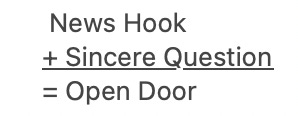Finding the Open Door to a Hard Conversation
A simple formula for starting tough but meaningful dialogue
My kids’ school emailed recently to let us know there will be a lockdown drill at school. It was a jarring reminder that I needed to check in with my kids about how safe they feel at school—but how do you even start that kind of conversation?
Don’t worry, this isn’t a political post about gun control or school safety (though I have opinions). It is a post about figuring out how to have tough but meaningful conversations.
When we know a conversation might be uncomfortable, it can be difficult to know how to get it started.
Many of us (me! I mean me!) tend to stall, hoping for the perfect open door to present itself. As if one of my teenagers was going to look up from their phone and say, “Hey Mom, I’ve been wanting to talk about my sense of safety at school.”
Not going to happen. So how do I create the opportunity?
A formula for making meaningful conversations happen
There’s a useful formula for getting the conversation started. It goes like this:
In journalism, a news hook is a timely piece of information that will grab the interest of the public. In this case, I think of a news hook as a current, external event that gives me a reason to raise the topic.
The email in my inbox, from the school district, gives me a reason to raise the topic of school safety.
I share additional examples of news hooks at the end of this newsletter.
The news hook is the open door to your conversation, but you still have to walk through it. What helps make that possible is a sincere question.
Sincere questions have three qualities:
You don’t know the answer already,
You are truly curious about it,
You are asking it with care, thoughtfully.
Something like, “Tell me about how you feel, in terms of safety, at school.”
News hook + sincere questions
What happens when you can’t think of a news hook? Often, there’s a natural news hook in your days—an email in your inbox, a conversation with a friend, something you heard on the news. If you don’t stumble across the right news hook, go searching for one.
If the conversation you want to start is on how to have a thriving relationships after the kids leave home, search for a podcast on the topic. Then say, “I just heard this podcast—let me tell you about it.” That will work.
Talking about some things is hard. Starting the conversation is easier with this formula. Let me know how it goes.
BONUS QUESTION:
What conversations are you avoiding lately? Let me know what sincere questions or news hooks you find to get the conversation started.

Examples of news hooks & sincere questions
Now that you have the basics (news hooks + sincere questions), here are additional examples of how to use this formula to open the door to meaningful, and sometimes difficult, conversations:
You feel like your team at work is focused on too many priorities, and the quality of your work is suffering. You want to ask your colleagues about this, but know others might feel differently.
You’ve just heard a podcast on fractured attention spans, so you say, “I was just listening to this show on how hard it is to focus when our attention is divided. I’ve been feeling that way lately and I wonder if it feels that way for the rest of you. Would you listen and let me know what you think?”Over lunch, a group of colleagues discuss their worries about adjusting to the empty nest phase of life. Later that week, one man says to his spouse, “The lunch table was talking about how weird it’s going to be when the kids leave home. What do we need to do now, to make sure our relationship survives, maybe even gets stronger, when the kids are gone?”
A friend’s mother dies unexpectedly, leaving your friend searching for her mother’s information on funeral wishes, insurance, and bank accounts. You ask your mom to meet for coffee, and start the conversation this way:
“Sarah’s been scrambling just to get access to her mother’s paperwork, and it’s causing her a lot of stress when she’s already grieving. It has made me think about how prepared we are. I hope I don’t need this info for decades, but can we have a conversation about what I need to know, to help take care of you, when that time comes?”



